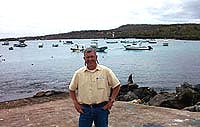
The Gulf of Mexico Fishery Management Council has appointed PERC Senior Fellow Don Leal to serve on an Ad Hoc Grouper Individual Fishing Quota Advisory Panel. Leal is one of two NGO representatives with Pam Baker of Environmental Defense filling the second position.
The Gulf of Mexico Fishery Management Council is one of eight regional Fishery Management Councils which were established by the Fishery Conservation and Management Act in 1976 (now called the Magnuson-Stevens Fishery Conservation and Management Act). The Council prepares fishery plans which are designed to manage fishery resources from where state waters end out to the 200-mile limit of the Gulf of Mexico. These waters are also known as the Exclusive Economic Zone (EEZ).
The Council consists of 17 voting members as follows: the southeast regional director of NMFS (or his designee), the directors of the 5 Gulf state marine resource management agencies (or their designees), and 11 members who are nominated by the state governors and appointed by the Secretary of Commerce. In addition, 4 nonvoting members represent the U.S. Coast Guard, Fish and Wildlife Service, Department of State, and the Gulf States Marine Fisheries Commission.
When reviewing potential rule changes, the Council draws upon the services of knowledgeable people from other state and federal agencies, universities and the public who serve on panels and committees.
The panel members will advise the council on matters pertaing to development of an IFQ program for the grouper fishery resources in the federal waters of the exclusive economic zone of the Gulf of Mexico. They will examine the benefits and consequences of using IFQs to manage the commercial grouper fishery.
Leal has been working for a nearly a decade on individual fishing quotas as a way to protect fisheries from overfishing and to improve the safety of the industry. He has written two books on the subject, testified before Congressional staff, and traveled widely to encourage the use of IFQs in various U.S. coastal areas as well as abroad. He also maintains a Web site: www.ifqsforfisheries with additional information on IFQs throughout the world.


